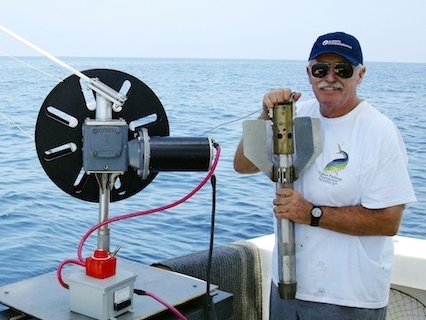
Fenical with a mud corer instrument during a Catalina Island expedition in 2009 (photo courtesy of Scripps Institution of Oceanography at UC San Diego).
By Amanda Holst, Public Affairs Assistant
Ever marvel at the mysteries crawling at the bottom of the ocean? One Department of Chemistry grad has turned a childhood interest in the ocean into a life-long pursuit.
William Fenical, MS Chemistry ’66, has dedicated most of his career trolling the ocean’s depths for his research in the field of marine biomedicine, the study of marine microorganisms for the discovery of new medicines in the treatment of human disease.
With his research team at the world-renowned Scripps Institution of Oceanography, this UC San Diego Distinguished Professor of Oceanography and Pharmaceutical Science looks at how microorganisms inhibit the growth of bacteria or fight cancer cells. The team has two drug discoveries from marine bacteria in phase II clinical trials for the treatment of cancer.
“It’s our goal to demonstrate what these resources are, and facilitate the pharmaceutical industry in how they might really exploit what we know,” Fenical said.
The team collects samples from ocean-floor sediments 40 miles off of California’s coastlines –some up to 4,000 meters (more than 2 miles) deep! The bacterial samples are then brought into the lab where they are cultivated.
As director for the Center for Marine Biotechnology and Biomedicine at the Scripps Institution, Fenical emphasizes innovation.
“It’s not up to us to turn the crank of something over and over using repetitive tools,” Fenical said. “It is up to us to discover new ways of doing things.”
According to Fenical, 95 percent of his team’s work involves finding unique organisms that lead to the discovery of brand new species, groups, taxonomical classifications, and orders of bacteria.
“We are happy to have had a role in bringing this diversity and potential of marine microbes to the attention of science as a whole,” he said.

